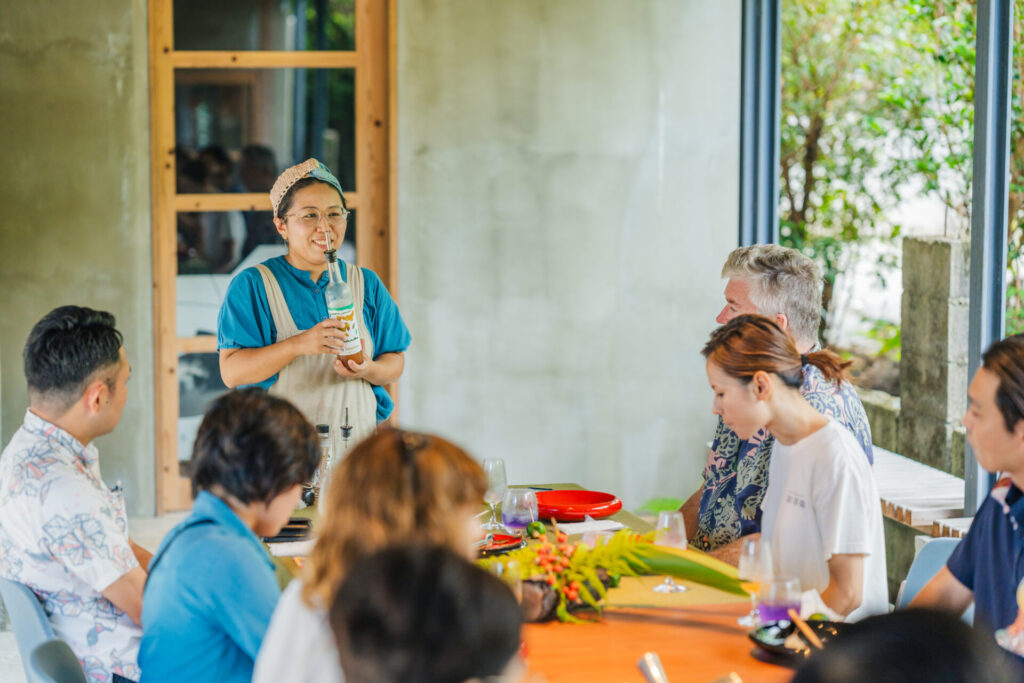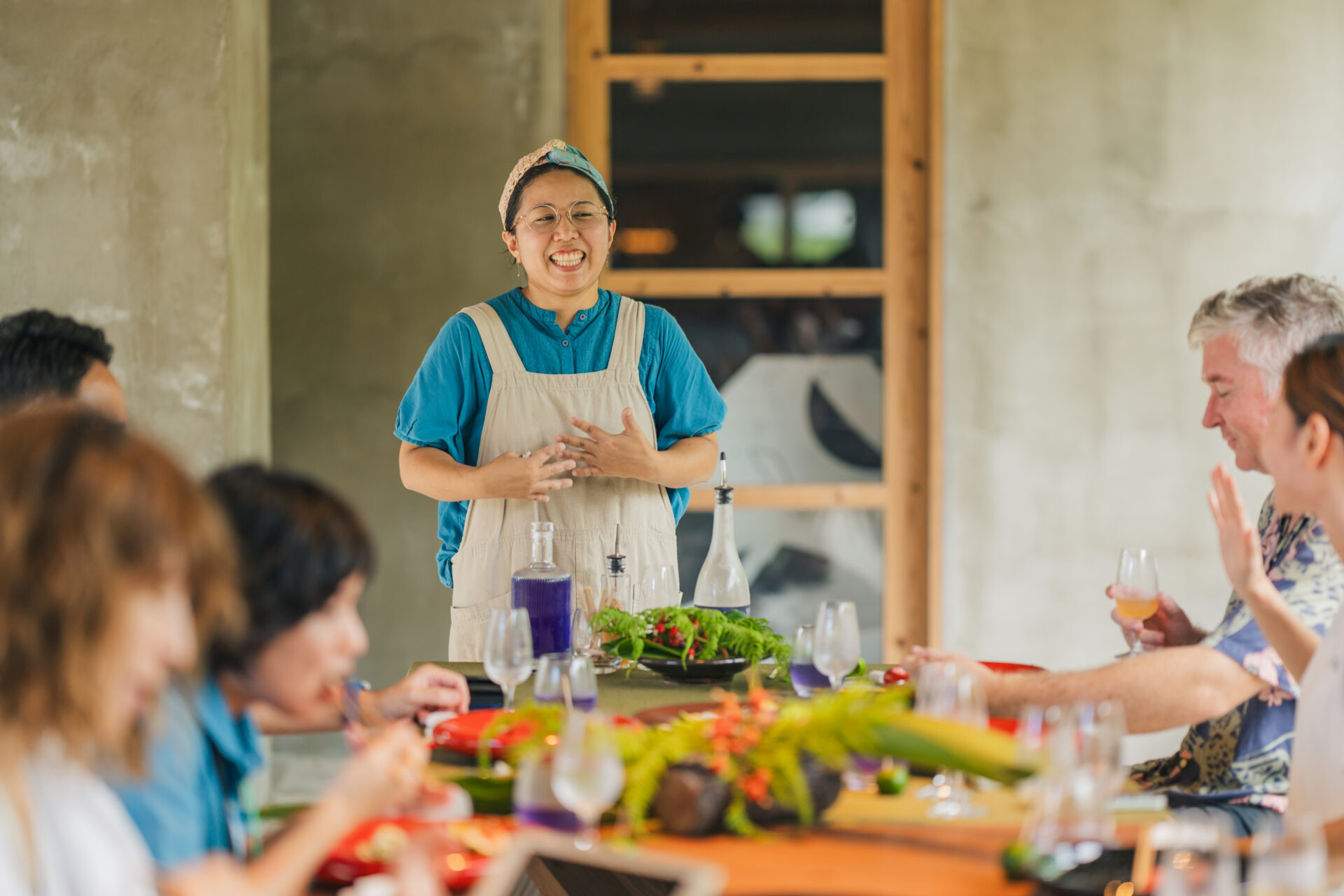
A Homeland’s Sake Passed from Grandfather to Grandchild: Carrying Awamori, the Spirit of Human Bonds, into the Future

池原 文子
Ayako Ikehara
Oogimi [Okinawa]
Ayako Ikehara
Born in Ōgimi Village, Okinawa. Fifth-generation brewer and president of Yanbaru Shuzō. After studying brewing science at university and gaining experience abroad, she returned to the family business in 2013. Raised with the support of her grandfather and the community, she devotes herself to preserving the bonds created through awamori for future generations. Along with brewing awamori, she also develops liqueurs and syrups made with local ingredients, building connections between the region, the brewery, and visitors from afar.
In Taka-ri, a district of Ōgimi Village in northern Okinawa—part of the World Natural Heritage site of Yanbaru—stands Yanbaru Shuzō, a brewery founded through the investment of local residents. For over 70 years it has continued producing awamori, Okinawa’s traditional distilled spirit. Its fifth-generation head is Ayako Ikehara, affectionately known as “Maruta Daughter.” Following in her grandfather’s footsteps, she began working in brewing, regarding awamori not just as alcohol but as an essential cultural tradition that connects people and supports the community. We spoke with her about her activities and hopes for carrying awamori into the future.
Life in Taka-ri Cannot Be Told Without Awamori
“Since high school I’ve been called ‘Maruta Daughter.’ That’s because the brand of sake our brewery produces is called Maruta. Its trademark is the character for ‘ta’ inside a circle. But now that I’m the mother of four children, I think it may be time to pass that nickname on.”
So says Ayako Ikehara, fifth-generation head of Yanbaru Shuzō, with a bright smile that charms everyone she meets.
The brewery stands in Taka-ri, at the border of Kunigami, Higashi, and Ōgimi Villages, surrounded by Yanbaru’s lush mountains. Here they make awamori, Okinawa’s traditional distilled liquor. To withstand the subtropical climate, it has a high alcohol content—commonly 25–30 percent, sometimes exceeding 50.
“In this village, awamori has always been present wherever people gather. For us, it’s island sake—indispensable for deepening our bonds.”
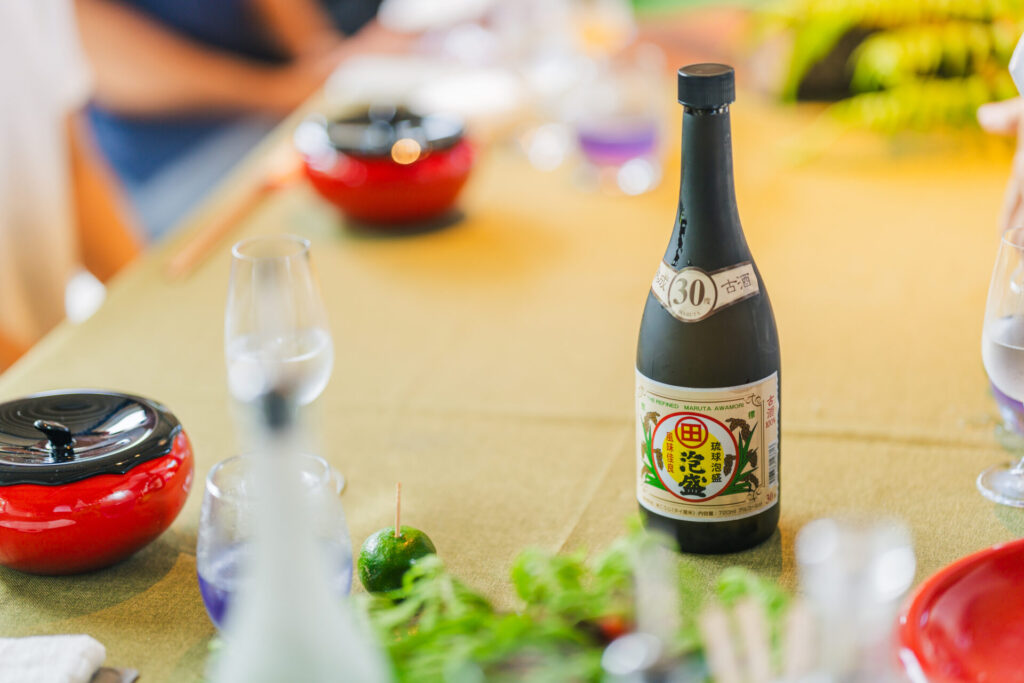
As she says, at Obon, New Year, festivals, or after community work, awamori is always placed at the center. Sharing cups and lively conversation strengthens ties.
“For me, born and raised here, this was always normal. People greeted me kindly—‘You’re Ikehara’s grandchild, aren’t you?’ The closeness was warm and comforting.”
A Grandfather’s Warmth and the Brewery’s Comfort Inspired Her Path
Yanbaru Shuzō traces its roots to 1950, when villagers pooled funds to establish Taka-ri Shuzō. Its central figure was Shinsui Ōmine, the uncle of Ayako’s grandmother, deeply trusted by locals. Management later passed to Ayako’s grandfather, Saburō Ikehara, who not only served as master brewer but also worked to generate profit so the brewery could be sustained into the future.
Ayako, much loved by her grandfather and the brewery workers, often spent her childhood there. Yet she never imagined she would one day take up the work.
“I actually once dropped out of high school. Looking back, it was just teenage uncertainty. My grandfather was the one who treated me gently then. He said, ‘If you’ve nothing to do, why not work with me?’ When I started helping, everyone in the brewery supported me too. They encouraged me: ‘You can do it. You’ve got potential.’ No one ever denied me.
In that environment, I naturally began to want to be useful to my grandfather and the others who had cared for me.”
She returned to high school, later studied brewing science at university, and after overseas study decided to inherit the family tradition, returning to the brewery in 2013.
Awamori as Part of Identity
Today Okinawa has 47 breweries, more than its 41 municipalities—proof that awamori is woven into daily life. Each brewery is small, but rooted in its community and producing unique flavors.
“Taka-ri is the same. Our history cannot be told without the brewery. People here see awamori as ‘our own sake.’ Even when we travel far, we drink awamori from our hometown or nearby. It’s part of our identity.”
About 70 percent of Yanbaru Shuzō’s production is consumed locally, reflecting how closely awamori and community life are bound.
“Even far away, a taste of awamori brings back one’s roots. That’s its power. My challenge now is how to pass on this value to the next generation. First, we need people to know about Yanbaru Shuzō and our products.”
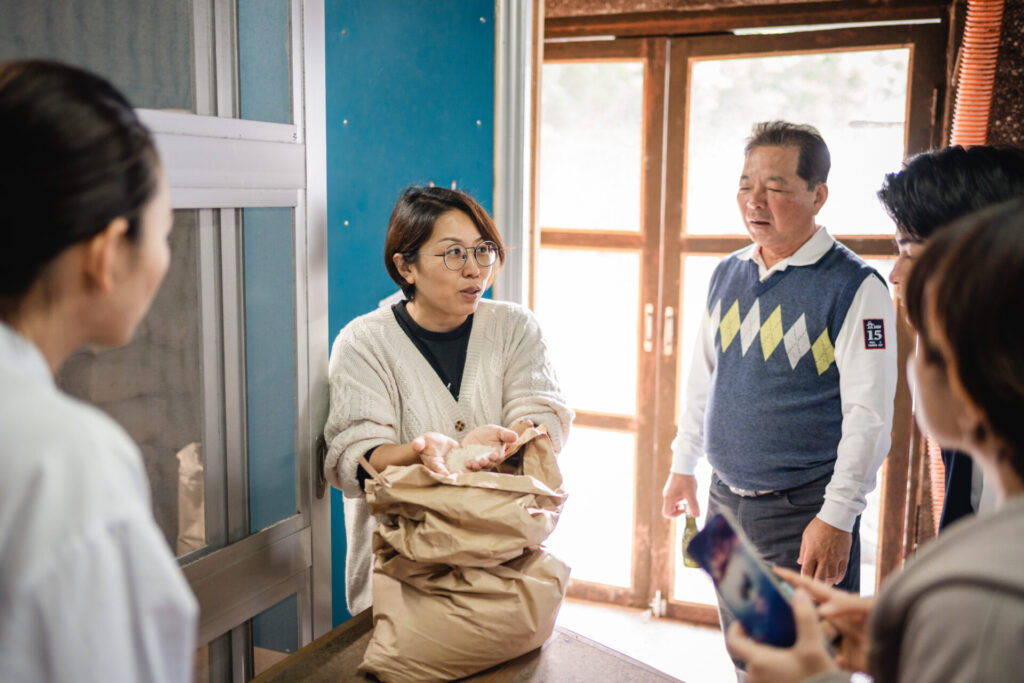
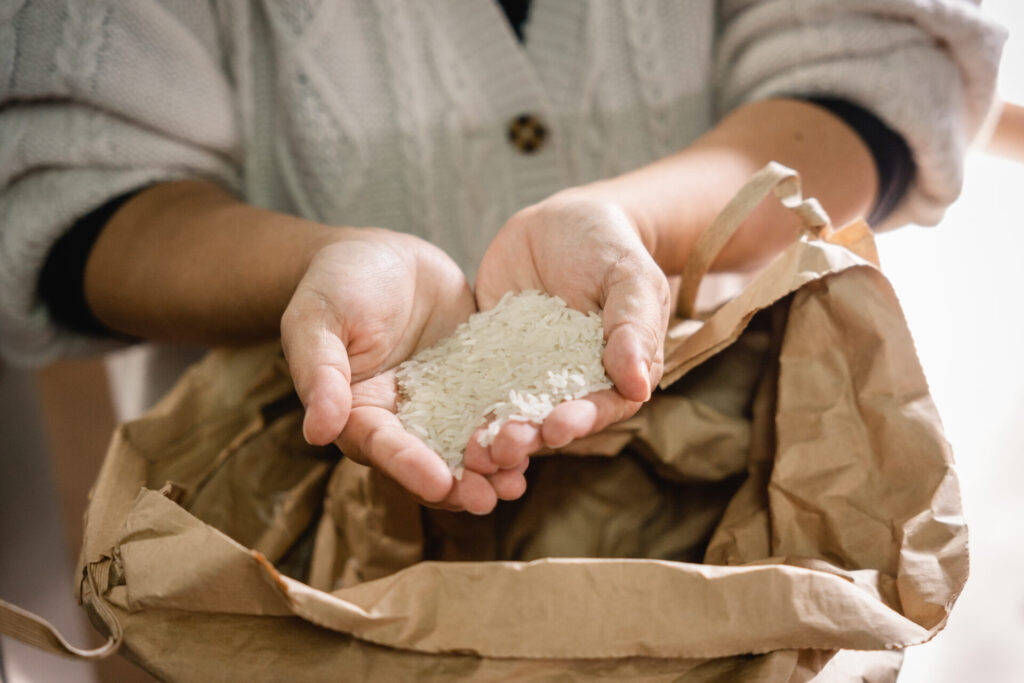
In old Okinawan dialect, “tūji” means wife—a reminder that women once often brewed sake. When Ayako returned to the brewery, she too aspired to be a master brewer.
“But working on-site, I realized that delivering our products to customers is just as important. Without people knowing our sake, brewing alone isn’t enough.
Now I focus on building the foundation so our brewers can fully express themselves and feel proud of what they make. That’s my role.”
Communities Built Around Awamori of Yanbaru
The brewery’s flagship product is, of course, awamori—its essence drawn from the pristine water of Yanbaru’s World Heritage forests. Rich in minerals, it supports the growth of black koji mold, vital to brewing, producing deep and mellow flavors.
“They say good water makes good sake. That’s Yanbaru’s blessing. Our awamori has the roasted aroma of rice and a smooth taste, thanks to the water.”
Since Ayako’s return, the brewery has expanded beyond awamori, developing liqueurs made with local bananas and “karaki” (cinnamon), attracting new fans. Inspired by her own pregnancy, when she could not drink, she also created syrups and jams from rare local fruits, so that people of all ages, including non-drinkers, can enjoy Yanbaru flavors. The brewery shop even offers tastings, serving as a place for visitors to connect.
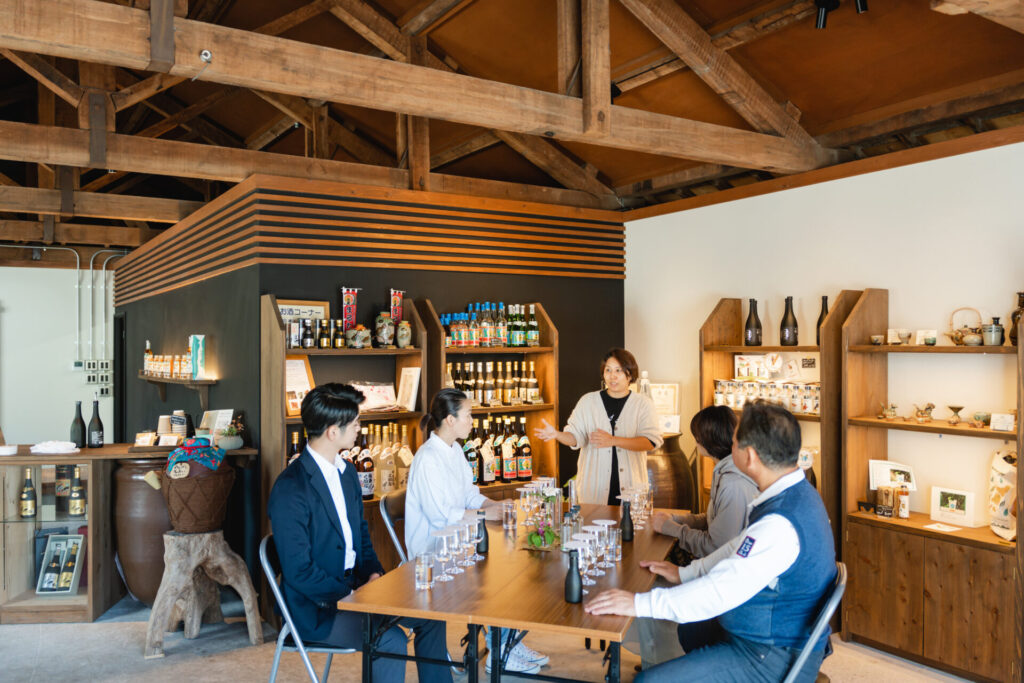
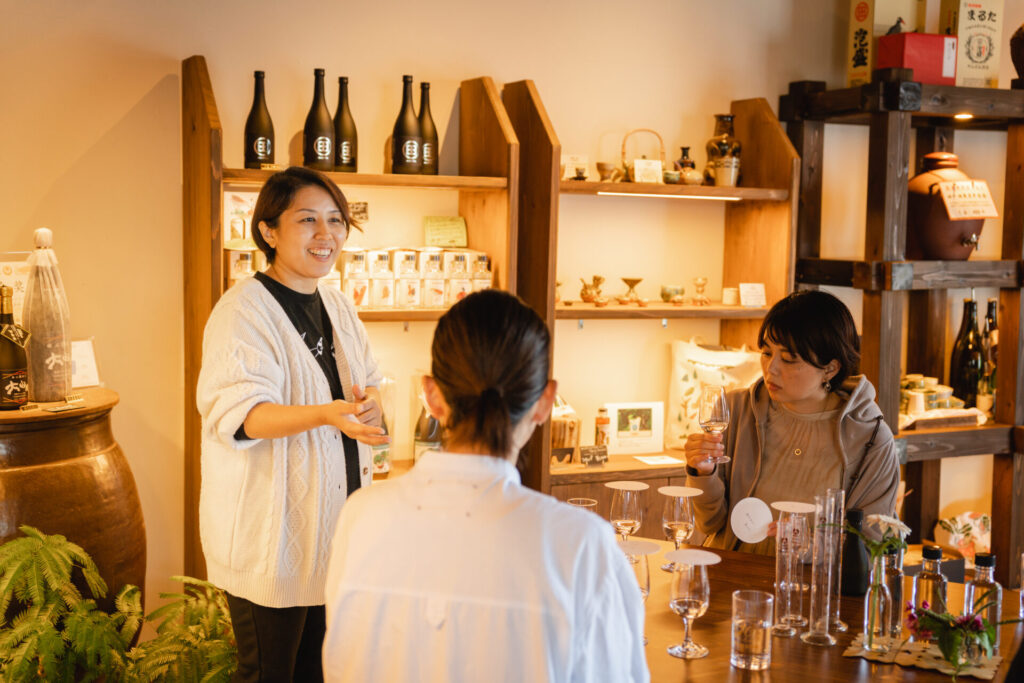
“I believe the best way to drink awamori is here where it’s made—surrounded by Yanbaru’s lush mountains, breathing the air, and understanding the passion behind it.”
She even introduces tourists to other breweries and local attractions. “Because I want people to fall in love with Okinawa and Yanbaru.”
This spirit also drives “Yanbaru Moai,” a program she launched a few years ago.
Moai is a traditional Okinawan system of mutual aid: members contribute money regularly and help one another in times of need. Today it often funds group meals or trips.
Yanbaru Moai adapts this idea. Members pay a fee to the brewery, receiving awamori, local mangoes, island shallots, and other goods, plus the chance to join an annual gathering at the brewery.
“The concept is like being distant relatives. We send local products, and members come here as if returning home. People tell us, ‘I’ve never enjoyed Okinawa like this before,’ or ‘There’s no other place that welcomes you like family.’
The brewery becomes a hub connecting locals and visitors. That’s the meaning of our sake. Truly, alcohol is the best tool for bringing people together.”
What Should Be Carried into the Future?
Finally, we asked what Ayako hopes to carry forward.
“Recently, many community centers and co-op stores have closed due to depopulation and aging. Places that used to be community hubs are now empty. That’s why I want Yanbaru Shuzō to always keep its doors open, welcoming people warmly—today, tomorrow, and for generations to come. To do that, we must also put into words the power of awamori to connect people.”
Yanbaru is also known for longevity. Elders cultivate their own fields, eat well, rest well, and return to work the next day. But above all, it is community communication that sustains them—and there awamori plays a central role.
Amid Yanbaru’s great nature, people live with gentle smiles, blessed by its bounty. For Ayako, this daily life is her original landscape, one she hopes to pass on to her children. At the heart of it all is awamori—a drink that connects, supports, and nurtures human bonds.
